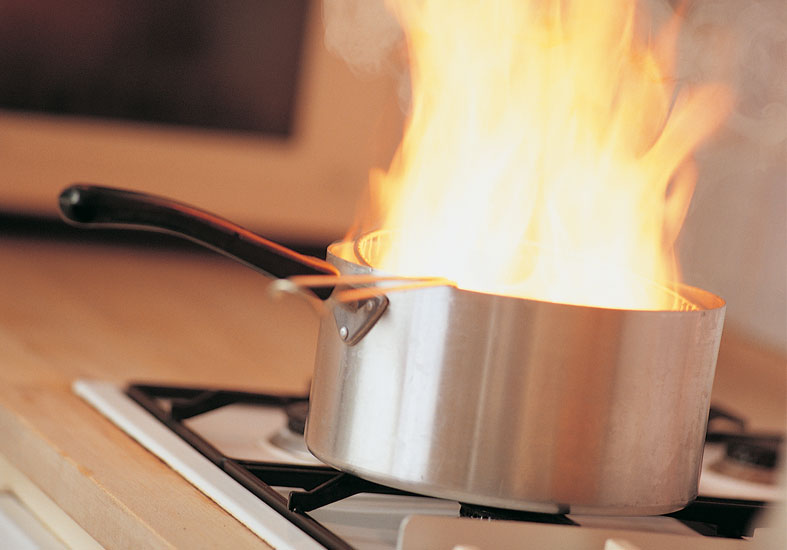
Does your neighbour block your escape routes?
All too often we see shared hallways used as overflow storage, either in shared access areas or on emergency exits outside. It's really dangerous to use these spaces as extra storage whether you live or work in a property as it can block escape routes for people upstairs and downstairs. This is especially dangerous if the items stored are flammable or subject to arson attacks – think about rubbish bags outside, or stores of spare oil or chemicals.
What should you do to stay safe?
If you are the business owner, make sure you have adequate storage elsewhere that doesn't compromise escape routes.
If you live above or below the premises that consistently block your escape route, the first thing to do is talk to your neighbour. If that doesn't help, the next step is contacting your Local Authority (local council) or getting in touch with us.
Craig Carter, Assistant Commissioner for Prevention & Protection says:
Almost on a daily basis our LFB Fire Safety Officers find dangerous conditions in shops that may affect residential accommodation above. These result in us taking legal action and even prohibiting the use of the building. It's important that both landlords and tenants pay attention to the fire safety advice on these pages and contact us if they have concerns.

Could a fire spread between shops and flats too easily?
Another problem we often see in flats above commercial premises is what's called a lack of proper separation. In laypersons terms, this means that fire can spread too easily between different areas of the building. This typically happens for three reasons:
Gaps and holes
Typically between the stairs and the commercial premises. A fire in the commercial premises can allow smoke and the products of combustion to enter the staircase and stop people exiting.
Signs to look out for:
- Damaged walls from the staircase to the commercial premises – look out for holes or large cracks.
- Ill-fitting or damaged doors in the wall from the commercial premises to the staircase.
- Holes in the floors exposing the premises beneath.
Residential entrance through the commercial premises
If a flat or bedsit can only be accessed through the commercial premises, fire can spread very quickly from one area to another and you may have no way to escape.
Signs to look out for:
- No separate entrance or way to leave quickly in an emergency.
Ducting
Ducting from the commercial premises running through a flat or bedsit can be dangerous too. A fire in the commercial premises ducting can allow fire and heat build up in the ducting and this could ignite items close by in your flat or bedsit. If the ducting is properly encased and kept clean, this isn't something to worry about.
Signs to look out for:
- A strong smell of cooking, or of hot fat or oil.
- Unexplained hot areas on walls, floors and in cupboards.
- Smoke coming from strange places in your flat.
Fires risks run two ways
Tenants above and below commercial premises accidentally start fires too – we see a number of electrical fires, candle fires and cooking fires above business premises.
How to stay safe if you're worried...
If you're worried about risks like gaps and holes, ducting running through your flat, or if there's a residential entrance accessible only through the commercial premises, you need to talk to your landlord.
These are all serious issues that landlords and property managers should address quickly. If they don't, contact your Local Authority (local council) or get in touch with us.

Is there a higher risk a fire might start?
There are many reasons fires start, but some factors increase the risk.
Signs to watch out for
- If the gas or electricity supply meters are under the stairs to your flat or bedsit and in a cupboard that isn't fire protected or is used for storage.
- Having electrical cables and gas supply pipes, and meters running in the entrance and stairs such that you can see them – if there is a fire in the property, it could get larger as these pipes are exposed to heat and flame.
- Having a Shisha area or other smoking area under a canopy at the rear of the commercial premises. If coals or cigarette ends are not properly extinguished, they can catch the canopy alight, allowing fire and smoke spread up the external façade of the premises.
- Excessive storage of flammable items (think tyres and refuse) in the rear area or gardens.
Increased risks and escape route concerns
All of these factors above might increase the risk of a fire starting, and could potentially block your escape route. If you are worried, it's important to talk to your landlord or property manager.
They should act to resolve the situation, but if they don't you can contact your Local Authority (local council) or get in touch with us.

Fire doors and escape routes really matter
Structurally speaking, flats or maisonettes within a building should have an access route that isn't through the commercial premises.
It's also important that there are appropriate fire doors in use. That means:
- If there is shared access, fire doors should separate commercial units and people's homes.
- These doors should be proper fire doors, and should be kept closed – not propped open for extra ventilation or storage!
- Your neighbours shouldn't store rubbish or supplies in your access or escape route.
Did you know?
60-minute protection floors, ceilings and walls from commercial to residential is a requirement – that means if you live in a flat above commercial premises, it should be fireproofed to stand 60 minutes before fire spreads.
Prevention is the best way to fight fires...
Good fire safety at home and at work is the best way to protect yourself and the people around you. Find out more:
Fire safety and electrical items
